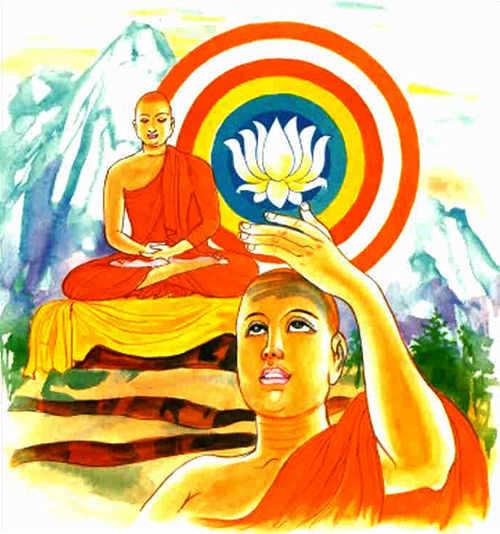Verse 160: One indeed is one’s own refuge; how can others be a refuge to one? With oneself thoroughly tamed, one can attain a refuge (i.e., Arahatta Phala), which is so difficult to attain.
The Story of the Mother of Kumarakassapa
While residing at the Jetavana monastery, the Buddha uttered Verse (160) of this book, with reference to the mother of Kumarakassapa.
Once, a young married woman asked permission from her husband to become a bhikkhuni. Through ignorance, she went to join some bhikkhunis who were the pupils of Devadatta. This young woman was pregnant before she became a bhikkhuni, but she was not aware of the fact at that time. But in due course, the pregnancy became obvious and the other bhikkhunis took her to their teacher Devadatta. Devadatta ordered her to go back to the household life. She then said to the other bhikkhunis, “I have not intended to become a bhikkhuni under your teacher Devadatta; I have come here by mistake. Please take me to the Jetavana monastery, take me to the Buddha.” Thus she came to the Buddha. The Buddha knew that she was pregnant before she became a bhikkhuni and was therefore innocent; but he was not going to handle the case. The Buddha sent for King Pasenadi of Kosala, Anathapindika, the famous rich man, and Visakha, the famous donor of the Pubbarama monastery, and many other persons. He then told Thera Upali to settle the case in public.
Visakha took the young girl behind a curtain; she examined her and reported to Thera Upali that the girl was already pregnant when she became a bhikkhuni. Thera Upali then declared to the audience that the girl was quite innocent and therefore had not soiled her morality (sila). In due course, a son was born to her. The boy was adopted by King Pasenadi and was named Kumarakassapa. When the boy was seven years old, on learning that his mother was a bhikkhuni, he also became a samanera under the tutelage of the Buddha. When he came of age he was admitted to the Order; as a bhikkhu, he took a subject of meditation from the Buddha and went to the forest. There, he practised meditation ardently and diligently and within a short time attained arahatship. However, he continued to live in the forest for twelve more years.
Thus his mother had not seen him for twelve years and she longed to see her son very much. One day, seeing him, the mother bhikkhuni ran after her son weeping and calling out his name. Seeing his mother, Kumarakassapa thought that if he were to speak pleasantly to his mother she would still be attached to him and her future would be ruined. So for the sake of her future (realization of Nibbana) he was deliberately stern and spoke harshly to her: “How is it, that you, a member of the Order, could not even cut off this affection for a son?” The mother thought that her son was very cruel to her, and she asked him what he meant. Kumarakassapa repeated what he had said before. On hearing his answer, the mother of Kumarakassapa reflected: “O yes, for twelve years I have shed tears for this son of mine. Yet, he has spoken harshly to me. What is the use of my affection for him?” Then, the futility of her attachment to her son dawned upon her, and then and there, she decided to cut off her attachment to her son. By cutting off her attachment entirely, the mother of Kumarakassapa attained arahatship on the same day.
One day, at the congregation of bhikkhus, some bhikkhus said to the Buddha, “Venerable Sir! If the mother of Kumarakassapa had listened to Devadatta, she as well as her son would not have become arahats. Surely, Devadatta had tried to do them a great wrong; but you, Venerable Sir, are a refuge to them!” To them the Buddha said, “Bhikkhus! In trying to reach the deva world, or in trying to attain arahatship, you cannot depend on others, you must work hard on your own.”
Then the Buddha spoke in verse as follows:
Verse 160: One indeed is one’s own refuge; how can others be a refuge to one? With oneself thoroughly tamed, one can attain a refuge (i.e., Arahatta Phala), which is so difficult to attain.
Dhammapada Verse 160
Kumarakassapamatuttheri Vatthu
Atta hi attano natho
ko hi natho paro siya
attana hi sudantena
natham labhati dullabham.
Source: Tipitaka








Add a comment